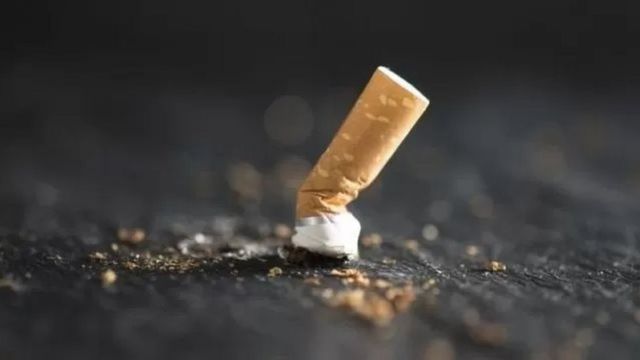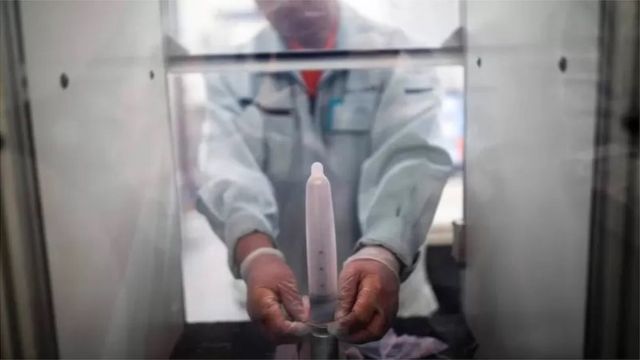- Sarah Allinson
- Senior Lecturer at Lancaster University
20 minutes ago
image source,Getty Images
If you want to avoid cancer in the future, it is best to develop healthy lifestyle habits from a young age
Most people don’t think about cancer in their twenties and thirties. But people born after the 1990s are more likely than any previous generation to develop cancer before age 50, according to a recent study.
When it comes to cancer, while some things we can’t change – like certain genes we inherit – up to half of all cancers can be avoided. This means that our early lifestyle choices have a major impact on cancer risk later in life.
Here are some of the most important lifestyle changes you can make right now to reduce your cancer risk.
One, don’t smoke

image source,Getty Images
Smoking is a major risk factor for cancer
Not only is smoking the leading cause of lung cancer every year, it is also linked to 14 other cancers, including those of the mouth and throat.
Young people are less likely to smoke now, thanks in part to the popularity of e-cigarettes. But research still shows that nine out of ten regular smokers started smoking before the age of 25. If you want to significantly reduce the risk of many types of cancer, quit smoking or quit smoking now.
Although e-cigarettes are certainly less harmful than smoking, their long-term effects have not been studied. For this reason, Cancer Research UK recommends using e-cigarettes only to help quit smoking. The risk of cancer from marijuana use is also unknown, although there is some evidence that there is a small link between marijuana use and an increased risk of testicular cancer. Until more search results are available, it’s best to avoid both as well.
Second, safe sex

image source,Getty Images
Using a condom is an important part of safe sex.
HPV (human papillomavirus), which can cause genital warts, is the most common sexually transmitted infection in the world. It can cause a number of cancers, including cancers of the cervix, penis, mouth and throat.
HPV-related cancers are particularly common in young adults. In the UK alone, cervical cancer is more common in women between the ages of 30 and 34. Meanwhile, the rise in HPV rates is believed to explain the recent rise in oral cancer among young men.
Getting the HPV vaccine and practicing safe sex will help protect you from the virus. For women, cervical screening (Pap smears) is just as important because it can detect HPV infection so that action can be taken before it has a chance to cause cancer. Therefore, women between the ages of 25 and 64 should be screened regularly every 5 years.
3. Maintain a healthy weight

image source,PA Medium
Obesity in women especially increases the risk of cancer
Being overweight or obese is associated with an increased risk of 13 different types of cancer, including cancers of the intestine, breast, uterus and pancreas. Too much fat can lead to inflammation in the body, which promotes tumor growth and helps cancer cells divide.
Fat cells also produce estrogen, which stimulates tumor growth in the breast and uterus. Therefore, the risk of cancer in women is more important. Cancers associated with being overweight or obese are becoming more common, especially among young adults.
Not only that, but a poor diet alone can increase the risk of cancer even more. For example, eating too much red and processed meat has been linked to an increased risk of bowel cancer. But on the other hand, there is mounting evidence that a healthy, balanced diet high in fiber and a variety of fruits and vegetables can actually reduce the risk of several types of cancer.
Therefore, following the right diet and maintaining a healthy weight are both great ways to reduce the risk of developing many types of cancer later in life.
Fourth, drink less alcohol

image source,Getty Images
Studies have shown that drinking less or no alcohol helps reduce the risk of cancer.
Alcohol is known to increase the risk of several cancers including cancers of the liver, breast and esophagus. While the more you drink, the greater the risk, even moderate consumption is believed to increase the number of cancer cases globally by up to 100,000 each year.
Although there are few studies on the effects of alcohol abuse, one study has shown that moderate drinkers who binge regularly are up to 50% more likely to develop breast cancer. Smoking while drinking can also increase the carcinogenic effects of smoking.
Drinking less or not drinking alcohol will help reduce the risk of cancer. The NHS recommends that you drink no more than 14 units of alcohol per week (about 6 pints of beer or 10 shots of wine) and that you try to avoid alcohol a few days a week.
Fifth, apply sunscreen

image source,Getty Images
The sun is hot, be sure to wear sunscreen
Skin cancer is one of the most common cancers in people under the age of 40. Cancer has also become more common in recent decades.
The main cause of skin cancer is UV rays, coming from the sun or from sunbeds. Since the effects of UV radiation are cumulative, parts of the skin that are most exposed to the sun, such as the face, are more likely to develop skin cancer.
In addition to this, being severely sunburned at a young age can especially increase the risk of developing the more dangerous types of skin cancer.
Protect yourself with sunscreen when you go out in the scorching sun. Wear a hat, wear long sleeves, and apply sunscreen with an SPF of at least 15, but remember that no sunscreen can provide 100% protection.
This is especially important for people at high risk for skin cancer, such as those with lighter skin and freckles.
Overall, the best way to reduce the risk of many types of cancer is also linked to maintaining better health. Other ways to improve overall health and prevent cancer include active exercise and the prevention of air pollution.
Note: Sarah Allinson is a senior lecturer at Lancaster University, UK This article was published on Creative Commons“dialogue”(The conversation)superior.


